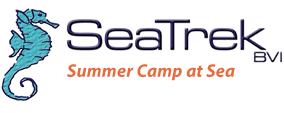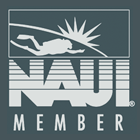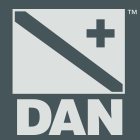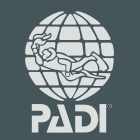In 2011, after five years in the making, the maiden voyage of SeaTrek FATHOMS set sail. Now entering the summer of 2021, we are celebrating the 10th anniversary of our FATHOMS voyage – Focused A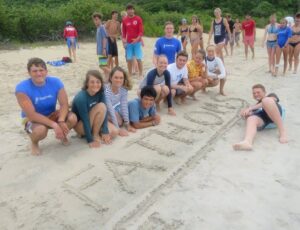 dventure Through Hands-On Marine Science. Time flies when you’re having fun! To commemorate the program that sparked the fire for many SeaTrek alums to study marine biology in university and propel their science careers, we wanted to take a trip down memory lane. For anyone who has attended a voyage with SeaTrek, you know it is like a family, so it was easy to catch up with FATHOMS alums and see what brought them to the program and where their marine biology journey has taken them since attending. Before we dive into their stories, let’s set the stage with a brief recap of what this fantastic science program entails.
dventure Through Hands-On Marine Science. Time flies when you’re having fun! To commemorate the program that sparked the fire for many SeaTrek alums to study marine biology in university and propel their science careers, we wanted to take a trip down memory lane. For anyone who has attended a voyage with SeaTrek, you know it is like a family, so it was easy to catch up with FATHOMS alums and see what brought them to the program and where their marine biology journey has taken them since attending. Before we dive into their stories, let’s set the stage with a brief recap of what this fantastic science program entails.
FATHOMS combines marine science, community service, and cultural studies in the Caribbean’s British Virgin Islands. Students live-aboard sailing catamaran during the 22-day voyage. The boat serves as a mobile research station, affording students countless opportunities to study and experience the ecology and dynamics of the living marine laboratory surrounding them. The FATHOMS science program incorporates the same high-quality scuba and sailing training provided by SeaTrek’s main programs with a unique itinerary emphasizing marine science.
The FATHOMS marine biology curriculum is designed to present multidisciplinary marine science concepts and equip the students with the tools necessary to investigate, better understand, and impact the world around them by applying the scientific method to a variety of experiences, including labs, field studies, and community service projects. FATHOMS also collaborates with local organizations like the Jost Van Dykes Preservation Society, Association of Reef Keepers, BVI Conservation and Fisheries De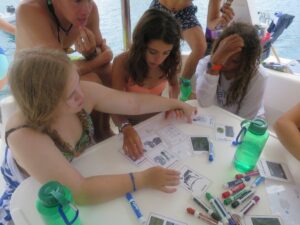 partment, and the National Parks Trust to engage students in real research and conservation projects. In working with these groups, students are responsible for collecting and reporting data and educating BVI residents. Click here for a deeper understanding of the program’s origins.
partment, and the National Parks Trust to engage students in real research and conservation projects. In working with these groups, students are responsible for collecting and reporting data and educating BVI residents. Click here for a deeper understanding of the program’s origins.
Now let’s hear from our past participants!
Kaitlin G., SeaTrek’s 2021 Lead Biologist, says, “As a previous participant in the FATHOMS program, I have so many good things to say from my experience both during and after my time in the BVI, but I’ll do my best to sum it up!
I decided to participate in FATHOMS right before I started college, where I studied marine ecology. I was looking to find a summer program packed with adventure and would give me a leg up in my future biology classes.
I’ve always been a student that learns by doing. Hence, FATHOMS’ emphasis on ‘hands-on marine science’ reinforced the foundational biology concepts that made studying for my final exams a breeze!
Aside from the educational benefit, one of my favorite aspects of the FATHOMS program was learnin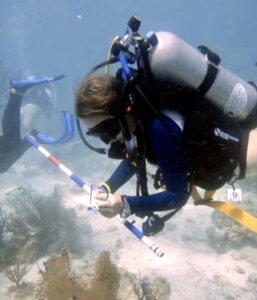 g different ways to collect scientific data above and below the surface! Even today, I am grateful for learning the basics of collecting scientific data with FATHOMS because I’ve used it both in my education and my career. For instance, I’ve used quadrats to study the population increase of invasive species in Southern California due to climate change and used a transect line to study overall environmental health from the abundance of intertidal species in South Africa.
g different ways to collect scientific data above and below the surface! Even today, I am grateful for learning the basics of collecting scientific data with FATHOMS because I’ve used it both in my education and my career. For instance, I’ve used quadrats to study the population increase of invasive species in Southern California due to climate change and used a transect line to study overall environmental health from the abundance of intertidal species in South Africa.
Since graduating from my undergrad, I worked as an educator for an internship program in South Africa, where I was in charge of teaching students how to collect data for long term research projects. In this role, it was critical that I understood those fundamental biological and ecological concepts that FATHOMS introduced me to 4 years prior. Using these concepts, I also created my own research project to conserve shark populations based on their ecology!
Not only can I attribute much of my success as an educator to FATHOMS, but equally as much to fuel my passion for the world of marine science. Marine science is an incredibly diverse field, and this is the perfect program to give you a well-rounded introduction to what life as a marine biologist might look like!” Kaitlin G, CO
Next, A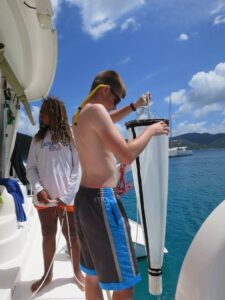 lly M., an environmental educator, states, “As a young high-schooler curious to explore a career in marine science, I was initially attracted to FATHOMS so that I could learn first-hand what a marine biologist does and how I could kickstart my career in that field. FATHOMS gave me that experience and more. Thanks to the well-designed curriculum and floating classroom, I learned valuable skills such as principles of scientific diving, bonded with fellow future marine scientists and mentors, and had the time of my life! I went on to study Environmental/ Marine Science and Sustainability at the University of Tampa. My FATHOMS experience set me ahead of my classmates, but it is also a big part of why I received a large scholarship for my tuition. I am currently working as an environmental educator, and it’s cool to come full circle; now I get to pass on to other young students the same kind of invaluable, hands-on learning experiences that I received in FATHOMS.” Ally M, FL
lly M., an environmental educator, states, “As a young high-schooler curious to explore a career in marine science, I was initially attracted to FATHOMS so that I could learn first-hand what a marine biologist does and how I could kickstart my career in that field. FATHOMS gave me that experience and more. Thanks to the well-designed curriculum and floating classroom, I learned valuable skills such as principles of scientific diving, bonded with fellow future marine scientists and mentors, and had the time of my life! I went on to study Environmental/ Marine Science and Sustainability at the University of Tampa. My FATHOMS experience set me ahead of my classmates, but it is also a big part of why I received a large scholarship for my tuition. I am currently working as an environmental educator, and it’s cool to come full circle; now I get to pass on to other young students the same kind of invaluable, hands-on learning experiences that I received in FATHOMS.” Ally M, FL
Finally, Aly Y., an alum from FATHOMS maiden voyage, remarks, “I was attracted to FATHOMS because I loved the sea and wanted to explore it through science and local people. FATHOMS helped ignite my passion for researching and working with coastal communities. This passion still drives me today, and I am currently working on a Ph.D. in Global Studies at the University of Iceland to continue to do this kind of work in the future. I can’t believe that a decade has passed since those life-changing two weeks in 2011. Although I still see myself as a student and don’t think that wi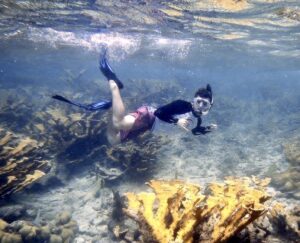 ll ever change, I am now working as the scientist I imagined becoming during FATHOMS. I have published a scientific paper using data that I collected underwater, using the same methods I was first taught at FATHOMS. FATHOMS was an incredible experience for me, and I am lucky to have had the opportunity to participate in it.” Aly Y, Iceland
ll ever change, I am now working as the scientist I imagined becoming during FATHOMS. I have published a scientific paper using data that I collected underwater, using the same methods I was first taught at FATHOMS. FATHOMS was an incredible experience for me, and I am lucky to have had the opportunity to participate in it.” Aly Y, Iceland
Each one of these amazing women in STEM started their careers on a FATHOMS marine biology voyage. Their journeys have all taken them in unique directions. Still, one thing remains unanimous amongst them all; they have carried the spark and fundamentals taught of FATHOMS with them through their journeys. Whether you are simply a marine science enthusiast or looking to make a career out of it, FATHOMS is the perfect building block for you.
Share your academic goals with us on Facebook, Instagram, and Twitter, and stay tuned for more fun blogs and events near you.
